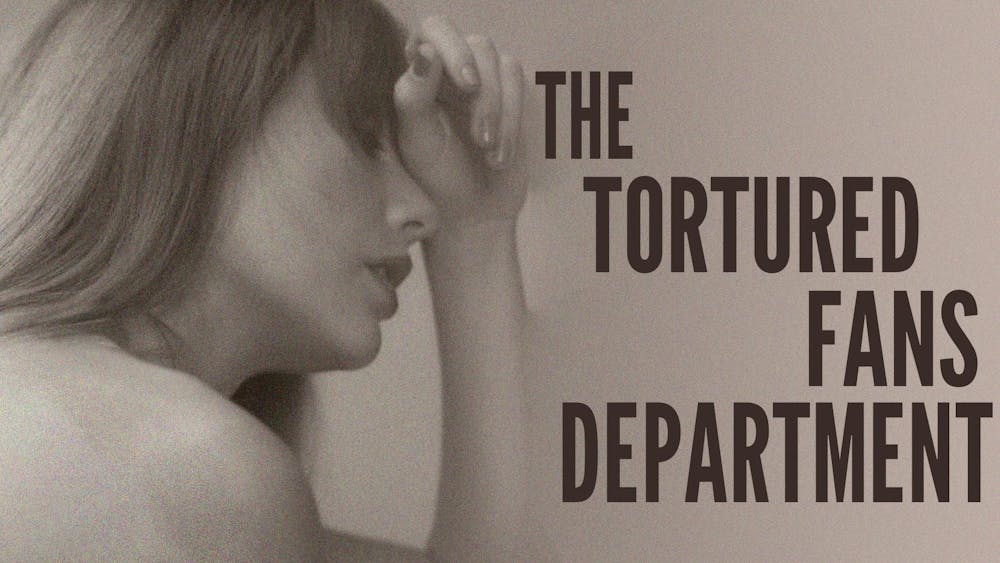
Four years after the release of E.L James’s best-selling novel “Fifty Shades of Grey,” Hollywood has finally publicized the narrative into its featured-film dopplegänger. Ranked number one in box office sales since its premiere last weekend, “Fifty Shades of Grey” has raked in an astounding $98 million, according to “Box Office Mojo.” The movie has exceeded “Twilight” by an average of $3,000 per week. Millions of people — notably women — have gathered to view this utterly intriguing yet highly disputed film in hopes of fulfilling their questions regarding pornographic relevance and — most notably — misogynistic manifestations.
The movie begins by introducing the meek, pure and somewhat awkward Anastasia "Ana" Steele (Dakota Johnson). In lieu of her ill roommate, Ana agrees to interview the renowned CEO billionaire Christian Grey (Jamie Dornan) for his contributions to her and her roommate’s university. Clumsy sparks fly between the rich older man and the modest younger woman — if you can call seductively chewing on an unsharpened “Grey” pencil romantic — and the hunt for sexual conquest begins.
Despite Ana’s feelings for Christian, she decidedly stifles any source of interest away … or so we think. A short while later, Christian makes a not-so-subtle appearance at the hardware store where Ana works, only to purchase rope, duct tape and zip ties (which comes in handy for the “Do-It-Yourself” kind of man that is Christian Grey). Deciding to maintain a platonic relationship, Christian and Ana civilly part ways. Later on, however, a drunken Ana — arguably the best acting throughout the movie — reaches out to Christian, who brings her back to his hotel room. Waking up dazed and confused, Ana realizes Christian has cleaned her vomit and changed her clothes … herein lies the beginning of the pair’s kinky yet captivating relationship.
Subsequently, Ana accompanies Christian on a stereotypical first-date helicopter ride, only to end up in his beautiful penthouse apartment. At this point, the movie introduces its audience to a primal form of feminist controversy: the written contract Christian requires Ana to sign before entering his “playroom.” One’s trite perceptions of romance drastically change as Christian conveys his preference to simply sleep with her rather than make love to her. Ana’s deference to sexual curiosity without actually succumbing to the role of Christian’s "subordinate” sparks an interesting question of feministic action. Does Ana’s refusal to sign the dominant-subordinate contract — a decidedly chauvinistic form of control — support the concept of a woman’s strength? Or does the slightest pique of interest in the relationship convey a “weakness” women have so stereotypically possessed throughout history?
In retrospect, both the film and the book portray Ana as a clichéd, introverted virgin with a rough parent situation and little self-confidence. The wealthy Grey, therefore, serves as her “knight in shining armor,” only to twist the conventional concepts of romance into something much less “chivalrous.” Thus, the audience — specifically the females — experiences a conflicted view of sympathy and apathy for Ana. Should they empathize with her curiosity considering her meek demeanor? Rather, many women believe Ana should channel her inner strength by refusing Christian from the get-go.
Throughout the rest of the film, Ana engages in a moral conflict questioning her relationship’s stability. Constantly wondering why Christian has become so romantically stoic and sexually ferocious, Ana finally implores him to punish her in the worst possible way. Christian reluctantly obliges, engaging in explicit, deviant behavior. Ana, mortified by this experience, forbids Christian from ever touching her again, and the movie comes to a quick, suspenseful end — Christian begs for forgiveness yet refuses to change his ways. Ladies, if you learn anything from this story, it’s that you can’t alter a person into becoming who you want them to be.
All in all, the surprisingly low amount of sex scenes certainly undermines the film’s hype. Rather, the audience enwraps itself in an unconventional, offensive “love” story, which brings to life many questions of gender roles and eroticism. Christian’s mysteriously kinky desires and Ana’s indecision spark an aura of contention for fans and haters alike. Through dramatic “Twilight”-esque acting, Johnson — a slightly less stiff version of Kristen Stewart — and Dornan perform to their best abilities, pulling off a film provoking 50 shades of controversy.













